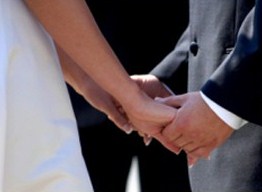The National Review Online’s (NRO) Kathryn Lopez interviewed Hilary Towers, a developmental psychologist, about “how we can better support and protect marriage as a culture and in communities.” The resulting article, “A Guide to Saving Marriage,” provides some surprising and many insightful results.
A recurring theme from Towers is that successful marriages demand hard work: “Young people, in particular, deserve to hear the truth about what to expect from a vocation to married life at this time in history. It can be the most fulfilling, joyful part of your entire life, and yet it is so very hard! At some point (and for many couples, extended periods of time), it will hurt if you’re doing it right. It will hurt because a part of yourself will be continually dying in order to give life to your spouse, to keep the marriage alive and thriving.”
Towers continuously challenges the status quo, or so-called conventional wisdom, including the two most common views of divorce, “either as two impetuous adolescents in adult bodies who argued too much and made the best choice to move on, or as two unfortunate souls who simply ‘fell out of love.’” Instead, she believes there is a third, more accurate view for the prevalence of divorce and its negative impact on culture, particularly our children: spousal abandonment.

She describes the cycle: “A couple is married with children. One spouse is frequently…from a home where one parent abandoned the other. Their level of conflict is within the range of normal. There are no red flags that the marriage is floundering until around the time when an adulterous relationship begins, and at some point is revealed.” She goes on to point out that the family of the offending spouse then encourages—tacitly if not explicitly—to abandon the marriage, thereby perpetuating a cycle of abandonment.
Cohabitation before marriage? Towers tells Lopez that it makes the eventual nuptials more unstable, “…cohabitation before marriage is associated with higher divorce rates, a greater proneness to infidelity…Cohabitation is the common thread of instability that runs through each of the alternatives to a lifelong, monogamous married life.”
Pornography and same-sex marriage are also covered in K-Lo’s eye-opening interview with the developmental psychologist, who unequivocally states that the former has no redeeming value to a marriage, “The verdict is [in] on pornography: Nothing good can come of it. Its sole effect is to destroy happiness and love.”
And on same-sex marriage, Towers is equally clear, “This debate isn’t about whether gay people deserve to be married. It’s about what marriage is. As Ryan Anderson says, one can’t really be in favor of a ‘square circle.’” But she explains the need to speak the truth in love to those with same-sex attractions saying, “…We love you as daughters and sons of God; that we respect your right to be treated with dignity and respect. But in the recent words of Washington, D.C.’s Cardinal Wuerl, marriage is a ‘human community that predates government. Its meaning is something to be recognized and protected, not reconstructed.’”
You can read the whole interview here.
What if marriage was like leasing a car?





 1. Never stop courting. Never stop dating. NEVER EVER take that woman for granted. When you asked her to marry you, you promised to be that man that would OWN HER HEART and to fiercely protect it. This is the most important and sacred treasure you will ever be entrusted with. SHE CHOSE YOU. Never forget that, and NEVER GET LAZY in your love.
1. Never stop courting. Never stop dating. NEVER EVER take that woman for granted. When you asked her to marry you, you promised to be that man that would OWN HER HEART and to fiercely protect it. This is the most important and sacred treasure you will ever be entrusted with. SHE CHOSE YOU. Never forget that, and NEVER GET LAZY in your love.
 The arguments for gay-marriage and abortion are fundamentally flawed because both put the rights of the adults ahead of those of the children. Adults create our laws and naturally have written them to benefit adults and the point of view of the child has been given too little weight. That’s wrong! This would be like the captain of the Titanic saying adults off first; leave the children behind. Children need to be thought of first.
The arguments for gay-marriage and abortion are fundamentally flawed because both put the rights of the adults ahead of those of the children. Adults create our laws and naturally have written them to benefit adults and the point of view of the child has been given too little weight. That’s wrong! This would be like the captain of the Titanic saying adults off first; leave the children behind. Children need to be thought of first. "..."Till death do us part... not till difficulties do us part," says State Sen. Josh Brecheen, R- Coal County. He's going after the number one reason Oklahomans are filing for divorce-- incompatibility. In his proposed bill, Oklahomans would have the option of choosing a "covenant marriage."
"..."Till death do us part... not till difficulties do us part," says State Sen. Josh Brecheen, R- Coal County. He's going after the number one reason Oklahomans are filing for divorce-- incompatibility. In his proposed bill, Oklahomans would have the option of choosing a "covenant marriage." It means that people in a same-sex marriages who discover that their spouse is unfaithful to them would not be able to divorce for adultery – unless it was with someone of the opposite sex.
It means that people in a same-sex marriages who discover that their spouse is unfaithful to them would not be able to divorce for adultery – unless it was with someone of the opposite sex.
 "...Adultery is a grave sin for Christians, but it's the sin of giving yourself a partial excusal from the sacred marriage vow -- of unilaterally taking back the gift of your body that you gave at the altar. So how exactly, from a Christian point of view, does breaking the whole vow publicly and explicitly make it better?
"...Adultery is a grave sin for Christians, but it's the sin of giving yourself a partial excusal from the sacred marriage vow -- of unilaterally taking back the gift of your body that you gave at the altar. So how exactly, from a Christian point of view, does breaking the whole vow publicly and explicitly make it better?

 Divorce-reform advocates are battling a cultural bias created by 40 years of legal precedent, concerns about increasing governmental involvement in private lives and the cost of seeking help. But they say this needs to be discussed to avoid more unnecessary pain.
Divorce-reform advocates are battling a cultural bias created by 40 years of legal precedent, concerns about increasing governmental involvement in private lives and the cost of seeking help. But they say this needs to be discussed to avoid more unnecessary pain.





